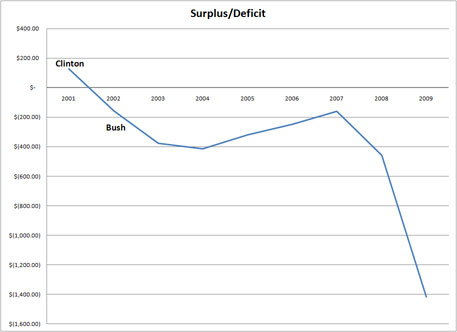
It is possible that there is going to be a “deficit commission” to look for ways to reduce our country’s budget deficits. I have some questions for them to ask to help get things started in the right direction:
1) President Reagan increased Social Security taxes, but used that money to cut the very top tax rates that only the wealthiest pay. Now that the money borrowed from Social Security is coming due, which income group is better positioned to pay it back, wealthy people or the elderly to whom this money is owed?
2) President Clinton left office with a huge budget surplus. Then, President Bush gave tax cuts to the wealthy, and his last budget had a $1.4 trillion deficit. How much of this change was because of those tax cuts for the rich?

3) How large was the country’s yearly budget deficit and total debt in the “Eisenhower/Truman” decades when the top tax rate was 90%?
4) Today we have an “infrastructure deficit” – the amount needed to repair our country’s roads, bridges, sewers, etc. – of somewhere upwards of $1.6 trillion. Was our infrastructure kept in good repair before the top tax rates were cut?
5) Concentration of wealth is long recognized as a threat to democracy, and now we are seeing a low-wage, everything-to-the-top economy with the greatest ever concentration of wealth going to a few at the top. Was the problem of wealth concentration increasing or decreasing before the top tax rates were cut?
6) When top rates were high people couldn’t take home vast fortunes in a single year. When it took several years to make a fortune did corporations depend on long-term or short-term thinking? Did the executives of corporations care if the infrastructure and communities their companies depended on were in good shape? Did large corporations fleece customers and exploit employees for quarterly returns as they do now?
7) The military budget is the largest item in our country’s budget. Was the military budget larger or smaller when we faced the cold war threat from the Soviet Empire?

8) Just how big is our military budget, if you add in veterans programs, nukes, intelligence and the military budget’s share of accumulated debt interest? How large is it in relation to all of the rest of the countries in the world, combined?
9) Speaking of debt interest, how much debt interest do we pay on the debt that has added up since we cut tax rates at the top? Who gets all that interest?
10) Some will say that proposals to bring back the tax rates of the Eisenhower administration are “socialist.” What was the name of the organization that accused President Eisenhower of being a Communist?
11) Does the following chart stimulate any ideas about how we might solve the debt problem?

Press freedom is under attack
As Trump cracks down on political speech, independent media is increasingly necessary.
Truthout produces reporting you won’t see in the mainstream: journalism from the frontlines of global conflict, interviews with grassroots movement leaders, high-quality legal analysis and more.
Our work is possible thanks to reader support. Help Truthout catalyze change and social justice — make a tax-deductible monthly or one-time donation today.